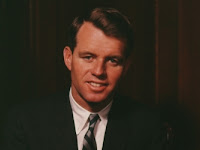Realpolitik Books - IV
Thirteen Days
A memoir of the Cuban Missile Crisis
The Cuban Missile Crisis, popularly known as the October Crisis, emerged on 16th October 1962 and continued till 28th October 1962. It was a confrontation between USA and USSR on the issue of deployment of Ballistic missiles by USSR on the soils of Cuba. The world held its breath as the two nations were on the verge of a full fledged nuclear war.
USSR supremo Nikita Khrushchev, in a secret agreement with the Cuban supremo Fidel Castro, decided to place the ballistic missiles in Cuba in response to presence of US ballistic missiles in Italy and Turkey. Also Castro wanted a deterrent which could prevent interference from US in Cuban matters.
Though USSR and Cuba denied presence of any such missiles in Cuba, the presence of the missiles were confirmed by American U2 spy planes. USA was in the midst of elections.
Thirteen Days is participant Robert F. Kennedy's memoir of the Cuban missile crisis that occurs from October 16 to October 28,1962. After taking cognizance of the diverse recommendations forwarded to him, President John F. Kennedy decides on blockade.
As the blockade goes into effect and Soviet ships steam forward ignoring the blockade, the situation becomes tense. However the Soviet ships stop dead in the water or turn back. The confrontation spills over to the U.N. Security Council. the situation becomes more grim when a U@ is shot down.
JFK and Khrushchev engage on a daily basis to resolve the conflict. It was blow hot one day and blow cold the next. The political drama was intensifying every day and the world was watching the development with bated breath.
However, good sense prevails and both superpowers accommodate each other to arrive at a solution. Participants are forbidden to give interviews or claim victory. JFK respects Khrushchev for doing his job and for looking out for the interests of mankind.
Robert F. Kennedy, brother of JFK, was Attorney General of USA. More than that he was a close adviser to JFK and his confidant. He saw the entire scenario unfold. He helped in the resolution of the crisis. He had first hand knowledge of the developments.
The agreement reached between President Kennedy and Khrushchev is a classic example of realpolitik. Publicly, the Soviets agreed to dismantle their offensive weapons in Cuba and return them to the Soviet Union, subject to United Nations verification. In exchange U.S. would declare and agree never to invade Cuba without direct provocation. Secretly, the United States also agreed that it would dismantle all U.S.-built ballistic missiles, which were deployed in Turkey and Italy against the Soviet Union but were not known to the public.
Namaste
Prabir


No comments:
Post a Comment